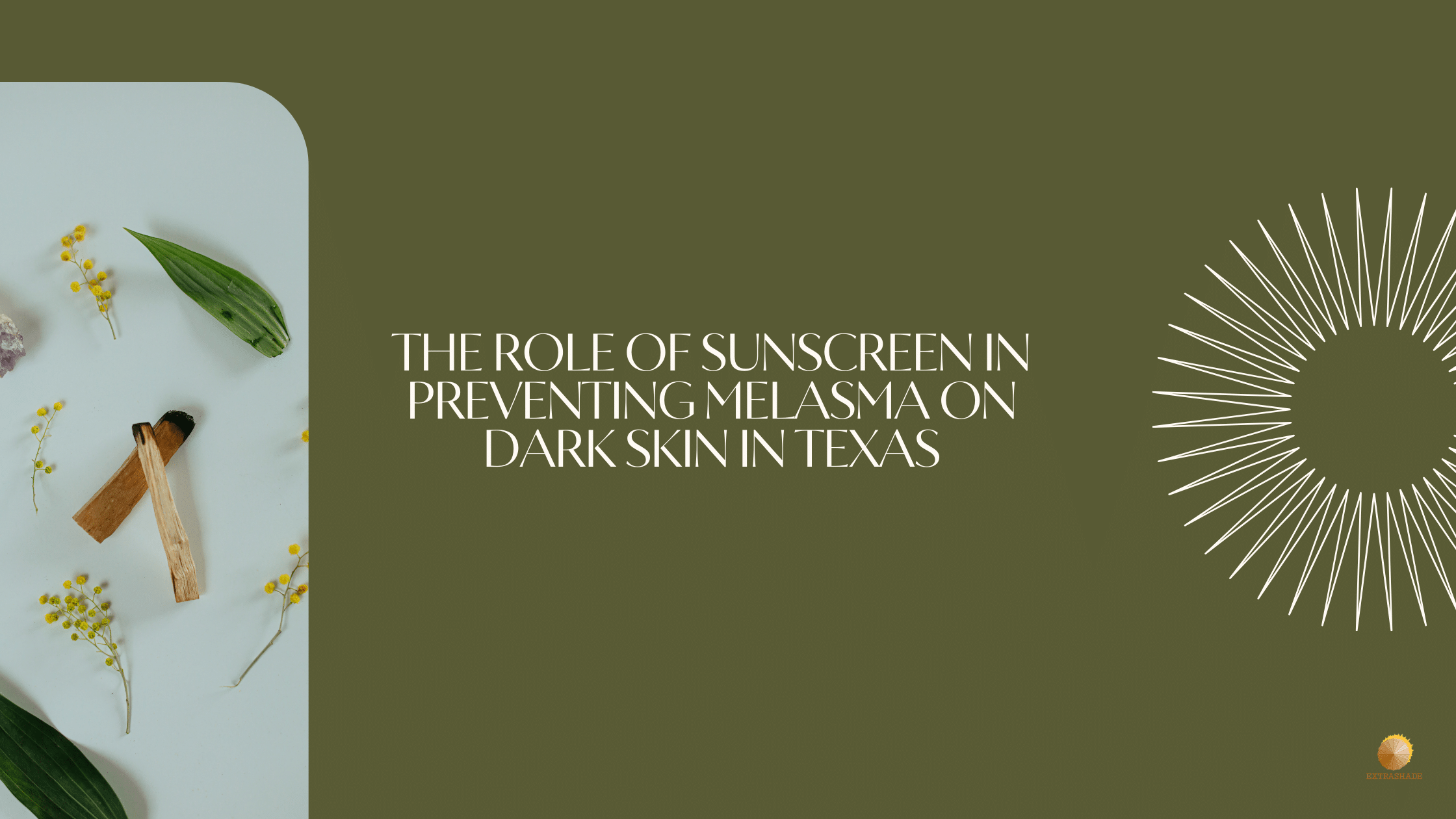Living in Texas, with its scorching sun and high UV index, those with dark skin often believe they’re naturally protected from sun damage. However, conditions like melasma—those unsightly dark patches on the face—can still develop. And unfortunately, the Texas sun can make them even worse.
Imagine walking out every day, thinking your skin’s natural melanin is enough, only to notice the increasing appearance of uneven dark spots. The frustration of seeing melasma worsen despite your efforts can be overwhelming, especially when treatments seem ineffective due to constant sun exposure.
Using a daily sunscreen, like EXTRASHADE, specifically designed for melanin-rich skin, provides the protection needed to prevent and reduce melasma. Sunscreen not only shields from the sun’s harmful rays but also helps maintain an even skin tone, giving you confidence in your skin’s health and appearance.
Understanding Melasma in Dark Skin
Melasma is a common pigmentation disorder that appears as grayish-brown patches, usually on the face, including the cheeks, forehead, and chin. While it can affect people of all skin tones, those with darker skin are particularly prone to this condition due to higher levels of melanin.
Melasma can be triggered by several factors, including hormonal changes (especially during pregnancy), genetics, and—most significantly—sun exposure. In regions like Texas, where the UV index is consistently high, the sun’s rays penetrate deeply into the skin, activating melanocytes, the cells responsible for producing melanin. This leads to hyperpigmentation and makes melasma more noticeable.
The Role of Sunscreen in Preventing Melasma in Texas
Sunscreen serves as the first line of defense against UV radiation, which is a significant trigger for melasma. Even brief sun exposure can worsen the condition. For those with darker skin tones, the use of sunscreens is particularly important, as melasma can become stubborn and difficult to treat once it sets in.
How Sunscreens Work
Sunscreens help by reflecting, scattering, or absorbing harmful UV rays, preventing them from penetrating deep into the skin where they can cause damage. Broad-spectrum sunscreens, which protect against both UVA and UVB rays, are essential in reducing the likelihood of triggering melasma or worsening existing spots.
The Importance of Using the Right Sunscreen for Dark Skin
When it comes to sunscreens, not all products are created equal. People with darker skin tones often face the challenge of finding a sunscreen that doesn’t leave behind a chalky, white cast. This is where EXTRASHADE comes in. It’s specifically designed for melanin-rich skin, offering broad-spectrum protection without the unwanted residue.
Key Benefits of EXTRASHADE for Dark Skin:
- Broad-Spectrum Protection: Protects against both UVA and UVB rays, ensuring that your skin is fully shielded from harmful radiation that can worsen melasma.
- Non-Greasy Formula: Many sunscreens feel heavy and oily, but EXTRASHADE provides a lightweight, breathable option that is ideal for daily wear.
- No White Cast: Formulated to blend seamlessly into darker skin tones, EXTRASHADE eliminates the worry of any unsightly white or ashy residue.
- Hydration and Care: In addition to UV protection, EXTRASHADE nourishes the skin with antioxidants and hydrating ingredients, promoting overall skin health.
How to Use Sunscreens for Maximum Protection
Applying sunscreen correctly and consistently is crucial to preventing and managing melasma. Here are some tips to ensure you get the most out of your sunscreen routine:
- Apply Generously: Don’t skimp on sunscreens! Apply a liberal amount to your face and any other exposed areas.
- Reapply Frequently: Sunscreen should be reapplied every two hours, especially if you’re spending extended time outdoors.
- Don’t Forget Key Areas: Melasma tends to appear in areas like the forehead, nose, and cheeks, so be sure to focus on these spots.
- Use It Daily: Even on cloudy or cool days, UV rays can still reach your skin. Make sunscreen a non-negotiable part of your skincare routine year-round.
Managing Melasma Beyond Sunscreen
While sunscreen is essential in preventing melasma, a comprehensive skincare routine can further help manage and reduce its appearance. Ingredients such as Vitamin C, niacinamide, and alpha hydroxy acids can aid in brightening the skin and reducing pigmentation. However, without proper sun protection, these treatments may prove ineffective in the long run.
Conclusion
In a place like Texas, where the sun shines intensely nearly all year round, protecting your skin from its harmful effects is crucial, especially for those with darker skin who are prone to melasma. Sunscreen, particularly one tailored for melanin-rich skin like EXTRASHADE, plays a pivotal role in preventing and managing melasma. Incorporating it into your daily skincare routine will not only help shield your skin from future damage but also improve its overall appearance and health.
Ultimately, daily sunscreen use is an investment in your skin’s long-term health, and EXTRASHADE offers a solution that meets the unique needs of dark skin. By embracing the protection that sunscreen offers, you can prevent melasma and enjoy a more even, radiant complexion in the sunny Texas climate.

